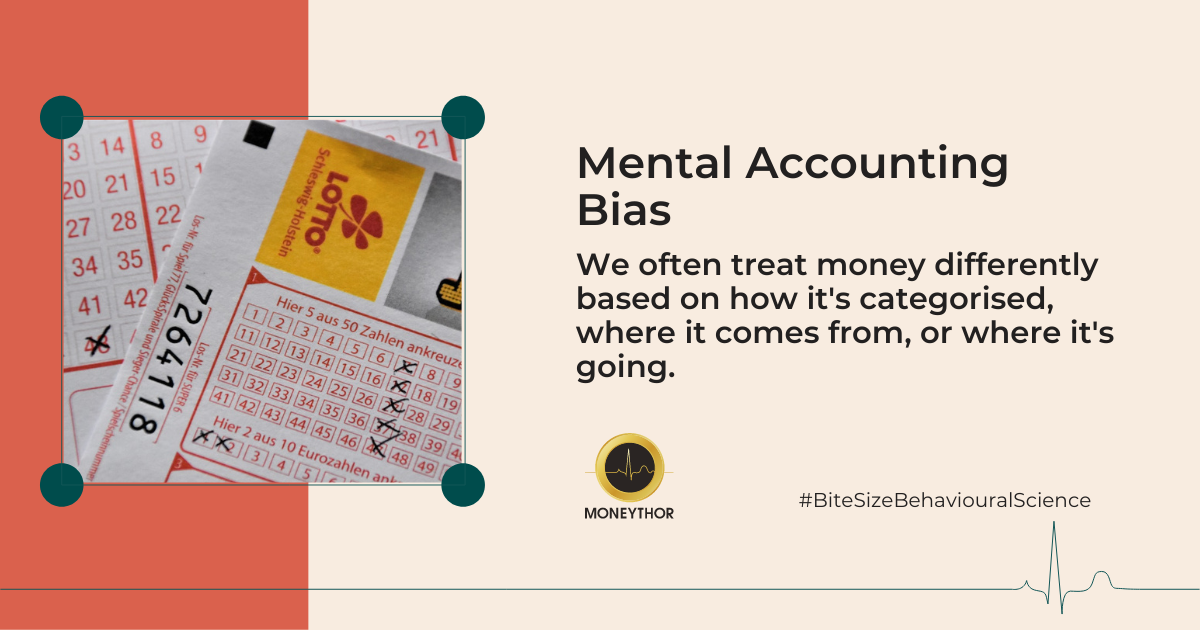Does money always mean the same thing to us? Or do we respond differently to money depending on where it comes from and where it’s going? Let’s say you won $2000 at the races; would you attach the same value to that money as you do to the $2000 you earn in your monthly salary? You would likely use your salaried income to cover basic expenses like rent and food. But the additional $2000? What would you use that for?
Economically, both $2000 sums are identical, however emotionally, they have different values to us which impacts how we spend, save and invest.
What is mental accounting bias?
Money is not just a means of exchange but also an emotional subject that affects our mental state. We often treat money differently based on how it’s categorised, where it comes from, or where it’s going. This tendency is known as mental accounting bias, and it can have a significant impact on our financial decisions (Thaler, 1999).
Mental accounting bias refers to the tendency for people to categorise and treat money differently depending on where it came from or how it will be used. For example, people may be more willing to spend money won in a lottery than money earned through work. Or they may be more likely to use money from a tax refund to splurge on a luxury purchase than money from their regular paycheck.
Why does it happen?
The reason for mental accounting bias is rooted in our psychology. We tend to view money as a scarce resource and want to use it in the most efficient way possible. By mentally categorizing money, we can better allocate it towards our needs and wants. This process simplifies our decision-making and reduces cognitive load.
Moreover, mental accounting can also be influenced by our emotions. We feel differently about money depending on its source and the emotional significance of the purchase. For instance, we may value money more if it’s earned through hard work, and we may be more willing to spend money on a special occasion such as a birthday or anniversary.
How can financial institutions use mental accounting bias to help customers manage their money better?
Financial institutions can use mental accounting bias to help their customers manage their money more effectively (Beshears & al., 2018). One way to do this is through personalized budgeting tools that categorize expenses based on their type, such as housing, transportation, and entertainment. This approach allows individuals to monitor their spending and make adjustments where necessary.
Another way to harness mental accounting bias is by promoting savings programs that offer specific incentives or benefits. For example, banks can offer savings accounts that earn higher interest rates or cashback rewards on specific categories of spending.
Furthermore, financial institutions can leverage mental accounting bias to encourage positive financial behaviors. By framing financial goals in a way that appeals to individuals’ emotional needs and desires, institutions can motivate them to take action towards achieving their goals. For instance, a bank may create a program that helps people save for a dream vacation by allowing them to set aside funds specifically for travel-related expenses.
Mental accounting bias is a natural tendency that can affect our financial decisions. By understanding this bias, financial institutions can design programs and tools that help individuals manage their money more effectively. Banks can use personalized budgeting tools, savings programs, and motivational programs to harness the effect of mental accounting bias to enable better personal financial management. By doing so, they can empower their customers to achieve their financial goals and improve their overall financial wellbeing.
For more bitesize bits of behavioural science and other digital banking insights, sign up to our monthly newsletter…

